Are you an athlete looking to take your performance to the next level? You might want to consider switching to a plant-based diet! In recent years, more and more athletes have been turning to plant-based nutrition to fuel their bodies, and the results are astounding. From improved recovery times to enhanced endurance, the benefits are hard to ignore. This guide will explore everything you need to know about plant-based diets for athletes, including the key nutrients, meal planning tips, and success stories from top performers. Let’s dive in and discover how you can boost your performance with the power of plants!
Table of Contents
The Rise of Plant-Based Diets in Sports
Historical context: How plant-based diets have evolved in sports
More and more scientific research in recent years show that plant-based diets have many health benefits, including better immune function, cardiovascular health and lifespan. So it is not strange that plant foods are making their way into sports. There are several major factors that make the decision of athletes to go vegan/vegetarian a no brainer:
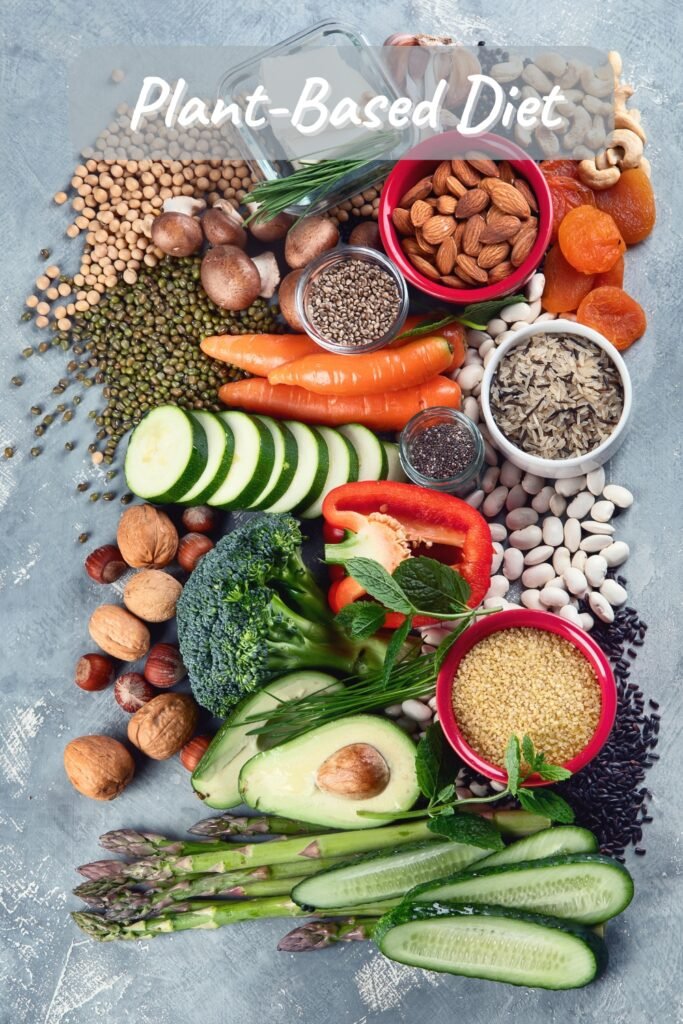
- Many plant based products have more protein than meat
- Plant based diets are better for the heart health of endurance athletes
- Recovery time is shorter when on plant-based diet
- Performance increase (shown by many pro athletes)
- Plant-based sports nutrition get more widely available
Notable athletes who have embraced plant-based nutrition
Here are a few of the well-known world class athletes who have gone vegan/vegetarian:
- Venus Williams – tennis legend who has won 7 Grand Slam Singles titles
- Novak Djokovic – another renowned tennis player with 24 Grand Slam titles to his name
- Lewis Hamilton – recing car driver with 7 Formula One World Drivers’ Championship titles
- Tia Blanco – professional surfer, vegetarian since birth
- Patrik Baboumian – retired world-recording-holding strongman and bodybuilder
- Dotsie Bausch – Olympic cyclist and world record-holder
- Rich Roll – ultra-endurance athlete
- Megan Duhamel – Olympic gold medalist figure skater
- Chris Smalling – soccer player
- Chris Paul – NBA star
There are many more names that can be added to the list and as you can see there are athletes coming from all kinds of sports.
The science behind plant-based diets and athletic performance
Recent research shows that plant-based diets can help athletes improve their performance by:
- Decreasing weight
- Creating leaner bodies (reducing body fat)
- Improving stamina
All the above are important factors when talking about professional athletes because they can influence their speed, endurance, power, strength, agility and appearance.
Essential Nutrients for Plant-Based Athletes
Protein sources: Lentils, tofu, tempeh, and more

If you want to increase your protein intake with more plants, here are some of the best options to do so:
- Tempeh – Protein per cup: 34 grams
It is made from fermented whole soybeans and can be crumbled into a texture like meat. Consider tempeh to be the bigger sister of tofu because it has a higher protein content than soy protein.
- Tofu – Protein per cup: 20 grams
To make tofu, which comes in silky, soft, firm, and extra-firm types, soy milk is curdled and then pressed into a block.
- Lentils – Protein per cup: 18 grams
Not only it is rich in protein, lentils can also deliver high amounts of iron and fiber to your body.
- Edamame – Protein per cup: 18 grams
Soy proteins of all kinds, including tempeh, tofu, and their cousin edamame rank among the top of our list ot plant-based protein sources because they deliver all 9 essential amino acids you need by themselves.
Vital vitamins and minerals: B12, iron, calcium, omega-3s
If you are on a plant-based diet you need to make sure to get enough vitamins and minerals either through the foods you eat or through supplements.
- Vitamin B12 – An insufficiency of Vitamin B12 may manifest in symptoms such as blurred vision, agitation, and oral ulcers. At least 1.5 micrograms per day are advise. The Vegetarian Society states that foods including breakfast cereals, soy milks, soy/vegetarian burgers, and vegetable margarines, as well as yeast extract, are excellent sources of vitamin B12 for those who avoid consuming animal products.
- Iron – Because it aids in the synthesis of haemoglobin, which carries oxygen in the blood and supports a strong immune system, iron is regarded as an essential nutrient. Anaemia from iron shortage can result in symptoms including headaches and exhaustion. People who adopt a vegan diet may be more vulnerable to iron shortage because many people obtain their iron from meat-based foods and cereal products. The daily recommended intake of iron by the British Dietetic Association is 8.7 mg for males over 19, 14.8 mg for women undergoing menopause, and 11.3 mg for male teenagers. The following plant-based iron sources can help with this: legumes and pulses, including beans, peas, and lentils dark green veggies, including broccoli, kale, and spinach, seeds and nuts
- Calcium – In order to maintain strong bones and teeth, calcium is essential. Due to their significantly reduced intake of calcium, vegans were shown to be more susceptible to fractures in a study comparing the fracture risks of vegetarians and nonvegetarians. For people aged 19 to 64, a daily dose of 700 mg is recommended to lower risk to bone health. Great plant based sources of calcium are: tahini, spinach, almonds, hazelnuts, oats.
Importance of a balanced diet: Macronutrients and micronutrients
Three categories can be used to further divide macronutrients: fat, carbs, and protein. Since these nutrients supply the fuel required for energy, growth, and maintenance, the body requires a comparatively high amount of them.
- Protein: A necessary component of muscular growth, it supports the immune system and aids in the synthesis of hormones.
- The body’s favoured energy source, carbohydrates also nourish the gut microbiota and spare protein.
- Fat: The body stores energy in this form, which also aids in nutrient absorption and hormone regulation.
The vitamins and minerals that your body needs to function are known as micronutrients. They maintain the proper functioning of your hormonal and metabolic systems rather than giving you energy or building blocks directly. Thirteen vitamins and twenty-one minerals are necessary. To be in good health, you need different amounts of each, which you have to get from your food. If deficiencies in any of these essential micronutrients are not treated promptly, they may result in a variety of symptoms and possibly hospitalisation.
Benefits of Plant-Based Diets for Athletes
Enhanced recovery: Anti-inflammatory properties of plant foods
Certain meals may help reduce chronic inflammation, according to studies. These consist of seafood, spices, fruit, vegetables, olive oil, and some berries.
There are benefits and drawbacks to inflammation.
One the one hand, it aids in your body’s defence against harm and infection. However, persistent inflammation has the potential to cause illness.
This risk can be further increased by poor activity levels, stress, and meals high in inflammation. Eating foods that can help reduce inflammation is therefore highly recommended.
Foods high in antioxidants, such as fruits, vegetables, and spices, may help lessen inflammation. The following foods may be the most anti-inflammatory:
- berries
- fatty fish
- broccoli
- avocados
- green tea
- peppers
- mushrooms
- grapes
- turmeric
- extra virgin olive oil
- dark chocolate and cocoa
- tomatoes
- cherries
Improved endurance: How plants fuel sustained energy
Plant-based diets have been shown to improve an athlete’s aerobic capacity, or how much oxygen they can breathe in, leading to an increase in performance and a longer period until exhaustion. This makes them useful for both strength and endurance training. Additional research has shown that runners who use vegetables for fuel have generally higher-quality diets and more endurance than their rivals who consume meat. Plant-based complex carbohydrates provide a steady flow of energy while also assisting in the maintenance of your muscles’ glycogen (energy) stores. Simultaneously, the absence of indigestible animal protein reduces fatigue.
An essential way that plant-based diets help your body function better is by increasing the amount of oxygen and blood that reaches your muscles. The rationale is that eating plant foods strong in fibre and antioxidants and low in saturated fats promotes healthier blood arteries. They accurately control blood flow by contracting and relaxing more quickly and effectively.
Additionally, compared to meat eaters, your blood is somewhat less thick (viscous), which facilitates a better exchange of nutrients and oxygen between the blood and body tissues. Vegetables naturally contain nitrates that slightly enlarge blood vessels, increasing blood flow to working muscles and enhancing athletic performance. They also encourage your muscles to replenish their energy more quickly and
Mental clarity and focus: Cognitive benefits of plant-based eating
Numerous advantages of a plant-based diet for brain health include reduced risk of Alzheimer’s disease and cognitive decline, increased focus and mental clarity, improved mood and emotional well-being, and decreased risk of stroke and other cardiovascular disorders.
Common Challenges and Solutions
Addressing protein myths: Meeting protein needs on a plant-based diet
Adopting a plant-based diet doesn’t have to mean you’ll be eating little to no protein. It can actually be rather simple to consume the required quantity of protein each and every day if you establish and adhere to a daily goal.
Age-based variations exist in the Recommended Dietary Allowance (RDA) for protein. The recommended daily allowance (RDA) for adults is 0.8 grams/kg of body weight, or 0.36 grams of protein per pound of body weight. Accordingly, the recommended daily allowance (RDA) for protein is 47 grams (1.7 oz) for an adult weighing 130 pounds and 62 grams (2.2 oz) for an adult weighing 170 pounds.
So if you are a vegan or a vegetarian it is absolutely no problem to get enough protein every day. It is recommended to eat a little more protein if it comes only from plant-based sources, not the typical 0.8 grams per kg but 0.0 grams per kg. And this is easily done by eating some of the food mentioned above, like tofu, tempeh, edamame, legumes, different nuts.
Meal prep tips: Easy and nutritious plant-based meal ideas
Even though some people think that it is difficult to be on a plant-based diet all the time because there are fewer options and it is hard to come up with new and fresh ideas for meals to prepare, this is actually not the case. There are plenty of delicious, easy and nutritious plant-based meals you can prepare for yourself and your family. Here are some good examples:
- Buddha Bowl – This bowl is filling and hearty thanks to the brown rice, chickpeas, and cosy roasted sweet potatoes. You can add massaged kale, radishes, carrots, and cabbage to finish it off, but any kind of vegetable would work well in this recipe. Try roasting butternut squash, broccoli, or cauliflower.
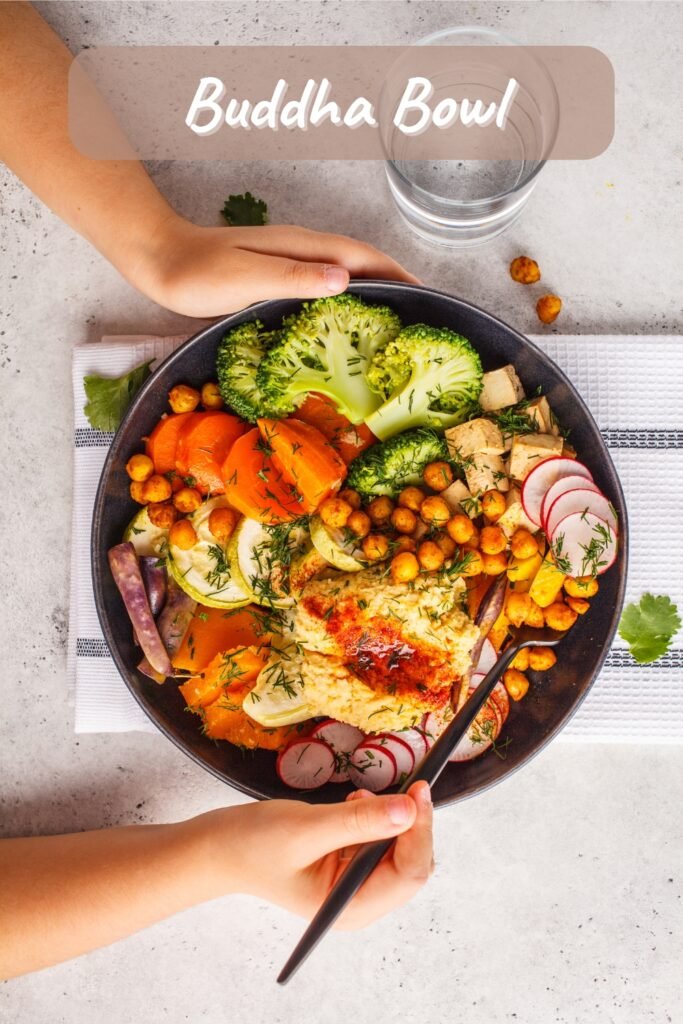
- Crispy Baked Falafel – You’ll want more as soon as you take one bite of this crispy baked falafel. Accessorised with pickled onions, tahini sauce, fresh herbs, and vegetables, this plant-based supper is just amazing.
- Cauliflower Steak – Roasted cauliflower “steak” with additional cauliflower-lemon sauce and some salsa verde on top. You will lick your fingers.
Of course there are many more recipes but you get the idea, plants can be used in various ways in meals to make them delicious and colourful.
Overcoming cravings and dietary changes
It’s normal to experience cravings when transitioning to a new eating regimen. It is important to always have a selection of plant-based snacks on hand. These nutritious options, which range from homemade oatmeal cookies and peanut butter bars to crunchy carrots and cucumbers, will keep you full and on track.
Cravings are frequently an indication that our bodies want particular nutrients or are just in the mood for comfort foods. You can easily tackle these cravings by keeping complete, plant-based snacks in your pantry. Indeed, it’s acceptable to initially miss some meals. As you learn about the full flavours of plant-based diet, your taste buds will change and foods that formerly seemed necessary will start to look less appetising.
Strategies to handle cravings:
- Keep a supply of healthful snacks on hand: For example, handmade oatmeal cookies, peanut butter bars, fresh fruits and almonds. They’re ideal for curbing appetite and averting impulsive decisions.
- Listen to your body: Cravings frequently point to a need for nutrition. For instance, if you want to eat something sweet, it may indicate that you need more energy; in this case, you could grab a fruit or a smoothie rather than processed sugar.
- Plan ahead: Having easily accessible, pre-prepared snacks really reduces your inclination towards bad foods. This planning entails keeping healthy substitutes on hand at all times and resisting the urge to purchase delicious items that don’t support your objectives. One more tip: it will be much simpler to resist if you don’t buy the unhealthy treats!
Sample Meal Plans and Recipes
Daily meal plan for plant-based athletes
Plant-based diets are excellent for fitness enthusiasts and athletes. Try this food plan that is designed to fit into your morning exercise schedule.
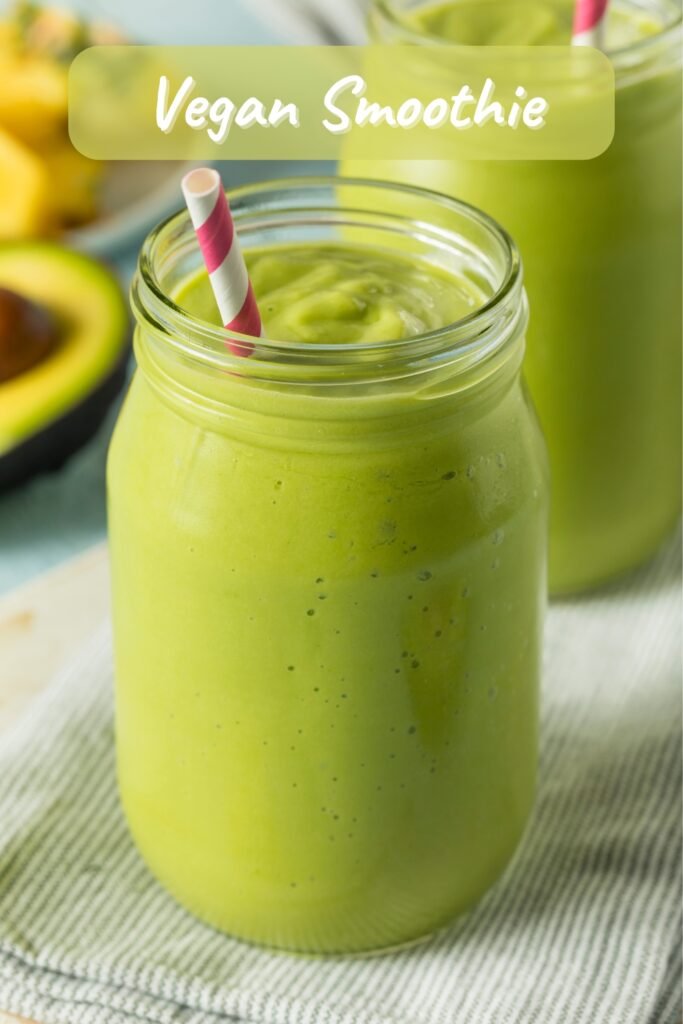
- Pre-workout Breakfast: Toss two slices of sprouted grain bread with peanut butter, banana, cinnamon, and 100% maple syrup to give yourself a boost.
- Post-workout Snack: Blend leafy greens, plant-based protein powder, pineapple, mango, and coconut water into a smoothie. You might also add optional items like almond butter, flax seeds, oats, ginger, and turmeric.
- Lunch: Savour a vegan Buddha bowl consisting of quinoa, roasted sweet potatoes, greens, baked tofu, and a tiny bit of almond butter or turmeric dressing.Snack: Have a vegan protein bar and an orange.Dinner: Choose pasta made with chickpeas and lentils with sautéed broccoli, zucchini and cherry tomatoes with a vegan kale pesto.
- Snack: Grab a handful of homemade trail mix.
Pre-workout and post-workout nutrition
It may take some trial and error to include vegan pre- and post-workout nutrition into your regular meals, but it is entirely possible.
In the end, there are many nutritional parallels between pre- and post-exercise routines. If you prefer it, you can frequently have the same food before and after your workout.
These recommendations would be roughly followed by an average diet of 2000 calories per day for both the pre- and post-workout meal:
– 20–40 grams of protein
– 40–80 grams of carbohydrates
– 5–12 grams of fat
– Several glasses of water or an energy beverage
Consumed about 60 minutes before or after your workout.
When in doubt, concentrate on consuming carbohydrates, protein, and water.
Conclusion
Switching to a plant-based diet can be a game-changer for athletes. By focusing on nutrient-dense foods, planning balanced meals, and learning from the pros, you can unlock a new level of performance and well-being. Ready to make the change? Start today and experience the benefits of a plant-powered lifestyle!

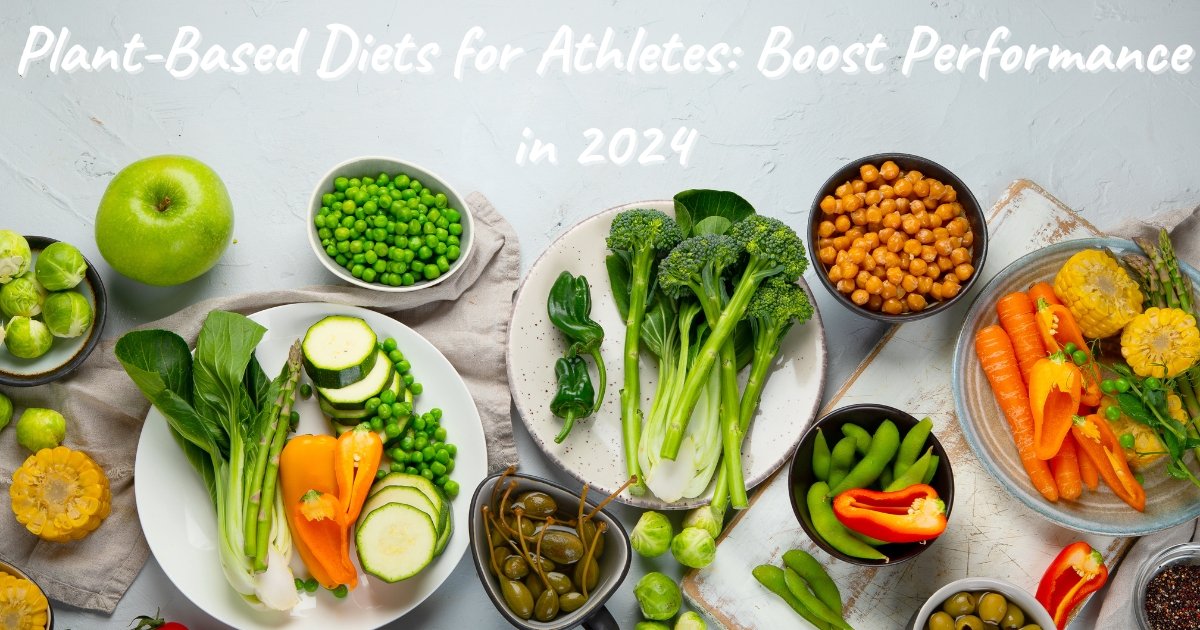
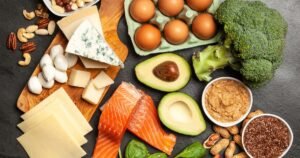


Pingback: Top Vegan Fitness Myths Debunked: What You Really Need to Know in 2024 - VitalityFitHub